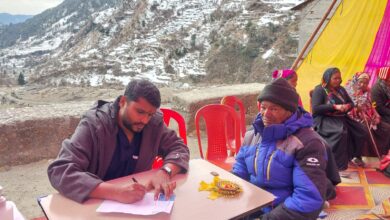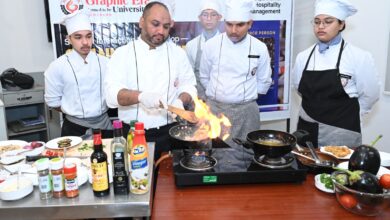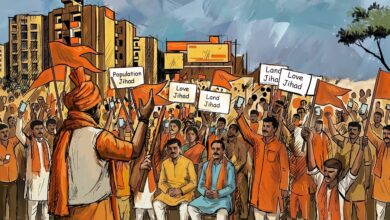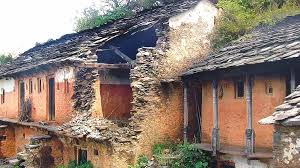Stringent UAPA sections imposed on all 107 Banphoolpura violence accused including seven women, Quami Ekta Manch seek Supreme Court monitored probe
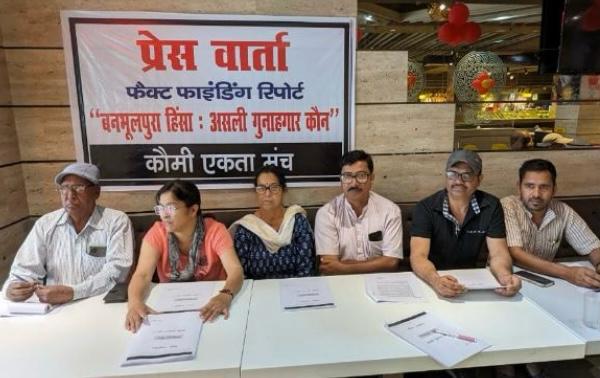
Stringent UAPA sections imposed on all 107 Banphoolpura violence accused including seven women, Quami Ekta Manch seek Supreme Court monitored probe
S.M.A.KAZMI
Dehradun, May 14
A day after Uttarakhand police imposed stringent Unlawful Activities Prevention Act (UAPA) usually used against terrorist acts, against all the accused persons in the Banphoolpura violent incidents of Haldwani town of Nainital district of Uttarakhand, Quami Ekta Manch, a group of public spirited bodies in its’ report titled “ Banphoolpura violence: who is the real culprit” demanded a Supreme Court monitored probe into the violence which occurred on February 8, 2024 claiming seven lives in police firing and alleged police repression later.
Uttarakhand police has initiated action under stringent UAPA against 107 persons including seven women who are in jail in connection with the violent incidents. The police had taken action against 36 persons under UAPA on February 26 but now 71 more persons including seven women who are in jail for alleged violence have been charged under UAPA. Haldwani police had registered three different cases in the Banphoolpura violence and jailed 107 persons including Abdul Malik, his son Moeed Malik including seven women. A total of 98 alleged accused were produced before District Judge, Haldwani on last Friday from where they were sent to judicial custody for 28 more days.
Meanwhile addressing a press conference, Rajni Joshi, Convenor of Quami Ekta Manch explained about the major findings of its’ report and demanded a Supreme Court monitored probe into Banphoolpura incident in which seven persons lost their lives while scores of people were injured and suffered damaged to their properties. The manch in it’s report also demanded a compensation of Rs. Five lakh to those injured and Rs. 25 lakh to the next of kin of those killed in police firing and monetary compensation where private property was damaged due to alleged police repression.
Quami Ekta Manch was formed by like-minded social and political outfits to probe the Banphoolpura violence that occurred on February 8, 2024. Those who attended the press conference include Rajni Joshi of Pragtisheel Mahila Ekta Kendra, Basanti Pathak of Uttarakhand Mahila Manch, P.P.Arya of Krantikari Lok Adhikar Manch, K.K.Bora of CPI(ML), Rohit of Inqualabi Mazdoor Kendra, Mahesh of Privartankami Chhatra Sangathan and Dheeraj Joshi of Mazdoor Sahyog Kendra.
The fact finding team found that the violent incident were the outcome of complete failure of the administration and communally biased attitude of the state government. The report also flagged the double standards of the political leadership by highlighting that Uttarakhand Chief Minister Pushkar Singh Dhami and local MP visited the injured police personnel but ignored the families of those killed in police firing. Similarly, the injuries to women police personnel were highlighted but the alleged police repression on poor people during curfew remained completely ignored.
The indictment of the BJP state government and police administration for their alleged biased communal approach before, during and after Banphoolpura violence by fact finding report of Quami Ekta Manch is not the first one. Earlier, a group of 83 senior retired civil servants including former bureaucrats, police officers and diplomats in a letter to the Uttarakhand Chief Secretary Radha Raturi in March this year had expressed their deep concern at violence in Haldwani and requested her to take urgent action to prevent the situation from deteriorating further, provide relief to the affected citizens of Haldwani, ensure that all citizens of the state feel safe and that the administration is perceived to be neutral in enforcing the law. However nothing much was done on the ground.
Former senior bureaucrats had also demanded an impartial judicial enquiry into the Haldwani incident and subsequent actions by the administration as they believed that the magisterial inquiry by the Kumaon Divisional Commissioner ordered by the state government was insufficient to convey the appearance of impartiality.
The former officials in their letter had also highlighted the press reports about police beating residents (including women and children1) and damaging property in the area, as well as detaining people.
The signatories had also drawn the attention to their earlier letters of 12 June 2023 and 18 July 2023, in which they had raised the concern about a violent and criminal campaign targeting the minority community that appeared to be underway in Uttarakhand state. Incidents of violence took place, including the vandalism and destruction of shops in the towns of Purola, Badkot and Haldwani, and, as noted, a climate of such terror was created that families fled, most of whom appear to have not been able to return. “It is deeply disturbing that no action at all appears to have been taken on these incidents. Individuals involved in dozens of incidents of hate speech have not even been prosecuted, and no one has been arrested till date for these serious crimes. The law must not only be enforced equally for all, it must also, in the public perception, be seen as being equally enforced for all individuals and sections of society,” letter said.
The former officials also requested that the orders of the Supreme Court regarding hate speech and mob violence be immediately enforced in Uttarakhand and the government take immediate steps to ensure that all its actions convey a message of security to all citizens of the state, regardless of religious community.
A fact finding team comprising Nadeem Khan and Mohd. Mobashshir Aneeq of Association for Protection of Civil Rights (APCR), Harsh Mander, Navsharan Singh, Ashok Sharma, Kumar Nikhil of “Karawan-e-Mohabbat” and Zahid Qadri, a civil rights activist in its’ report in the month of February, 2024 had reported police repression and enormous avoidable hardships and sufferings caused to the inhabitants who are low-income daily wage earners.



